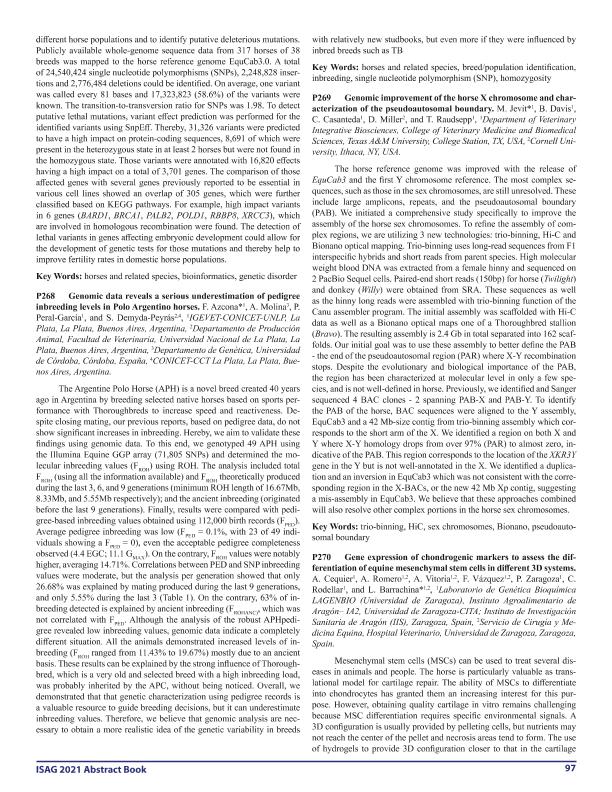Mostrar el registro sencillo del ítem
dc.contributor.author
Azcona, Florencia

dc.contributor.author
Molina Alcalá, Antonio

dc.contributor.author
Peral Garcia, Pilar

dc.contributor.author
Demyda Peyrás, Sebastián

dc.date.available
2023-08-11T13:43:54Z
dc.date.issued
2021
dc.identifier.citation
Genomic data reveals a serious underestimation of pedigree inbreeding levels in Polo Argentino horses; 38th International Society for Animal Genetics Virtual Conference (2021); Virtual; Estados Unidos; 2021; 97-97
dc.identifier.uri
http://hdl.handle.net/11336/207885
dc.description.abstract
The Argentine Polo Horse (APH) is a novel breed created 40 years ago in Argentina by breeding selected native horses based on sports performance with Thoroughbreds to increase speed and reactiveness. Despite closing mating, our previous reports, based on pedigree data, do not show significant increases in inbreeding. Hereby, we aim to validate these findings using genomic data.To this end, we genotyped 49 APH using the Illumina Equine GGP array (71,805 SNPs) and determined the molecular inbreeding values (FROH) using ROH. The analysis included total FROH (using all the information available) and FROH theoretically produced during the last 3, 6, and 9 generations (minimum ROH length of 16.67Mb, 8.33Mb, and 5.55Mb respectively); and the ancient inbreeding (originated before the last 9 generations). Finally, results were compared with pedigree-based inbreeding values obtained using 112,000 birth records(FPED).Average pedigree inbreeding was low (FPED=0.1%, with 23 of 49 individuals showing a FPED=0), even the acceptable pedigree completeness observed (4.4 EGC; 11.1 GMAX). On the contrary, FROH values were notably higher, averaging 14.71%. Correlations between PED and SNP inbreeding values were moderate, but the analysis per generation showed that only 26.68% was explained by mating produced during the last 9 generations, and only 5.55% during the last 3 (Table 1). On the contrary, 63% of inbreeding detected is explained by ancient inbreeding (FROHANC), which was not correlated with FPED. Although the analysis of the robust APHpedigree revealed low inbreeding values, genomic data indicate a completely different situation. All the animals demonstrated increased levels of inbreeding (FROH ranged from 11.43% to 19.67%) mostly due to an ancient basis. These results can be explained by the strong influence of Thoroughbred, which is a very old and selected breed with a high inbreeding load, was probably inherited by the APC, without being noticed. Overall, we demonstrated that that genetic characterization using pedigree records is a valuable resource to guide breeding decisions, but it can underestimate inbreeding values. Therefore, we believe that genomic analysis are necessary to obtain a more realistic idea of the genetic variability in breeds with relatively new studbooks, but even more if they were influenced by inbred breeds such as TB.
dc.format
application/pdf
dc.language.iso
eng
dc.publisher
International Society for Animal Genetics
dc.rights
info:eu-repo/semantics/openAccess
dc.rights.uri
https://creativecommons.org/licenses/by-nc-sa/2.5/ar/
dc.subject
Polo
dc.subject.classification
Tecnología GM, clonación de ganado, selección asistida, diagnósticos, tecnología de producción de biomasa, etc.

dc.subject.classification
Biotecnología Agropecuaria

dc.subject.classification
CIENCIAS AGRÍCOLAS

dc.title
Genomic data reveals a serious underestimation of pedigree inbreeding levels in Polo Argentino horses
dc.type
info:eu-repo/semantics/publishedVersion
dc.type
info:eu-repo/semantics/conferenceObject
dc.type
info:ar-repo/semantics/documento de conferencia
dc.date.updated
2022-11-09T16:45:08Z
dc.journal.pagination
97-97
dc.journal.pais
Estados Unidos

dc.journal.ciudad
Champaign
dc.description.fil
Fil: Azcona, Florencia. Consejo Nacional de Investigaciones Científicas y Técnicas. Centro Científico Tecnológico CONICET- La Plata. Instituto de Genética Veterinaria "Ing. Fernando Noel Dulout". Universidad Nacional de La Plata. Facultad de Ciencias Veterinarias. Instituto de Genética Veterinaria; Argentina
dc.description.fil
Fil: Molina Alcalá, Antonio. Universidad de Córdoba; España
dc.description.fil
Fil: Peral Garcia, Pilar. Consejo Nacional de Investigaciones Científicas y Técnicas. Centro Científico Tecnológico CONICET- La Plata. Instituto de Genética Veterinaria "Ing. Fernando Noel Dulout". Universidad Nacional de La Plata. Facultad de Ciencias Veterinarias. Instituto de Genética Veterinaria; Argentina
dc.description.fil
Fil: Demyda Peyrás, Sebastián. Consejo Nacional de Investigaciones Científicas y Técnicas. Centro Científico Tecnológico CONICET- La Plata. Instituto de Genética Veterinaria "Ing. Fernando Noel Dulout". Universidad Nacional de La Plata. Facultad de Ciencias Veterinarias. Instituto de Genética Veterinaria; Argentina
dc.relation.alternativeid
info:eu-repo/semantics/altIdentifier/url/https://www.isag.us/Docs/Proceedings/ISAG2021_Proceedings.pdf
dc.relation.alternativeid
info:eu-repo/semantics/altIdentifier/url/https://www.isag.us/Docs/Proceedings/ISAG2021_Proceedings.pdf?v=20211015
dc.conicet.rol
Autor

dc.conicet.rol
Autor

dc.conicet.rol
Autor

dc.conicet.rol
Autor

dc.coverage
Internacional
dc.type.subtype
Conferencia
dc.description.nombreEvento
38th International Society for Animal Genetics Virtual Conference (2021)
dc.date.evento
2021-07-26
dc.description.ciudadEvento
Virtual
dc.description.paisEvento
Estados Unidos

dc.type.publicacion
Book
dc.description.institucionOrganizadora
International Society for Animal Genetics
dc.source.libro
Abstracts: 38th International Society for Animal Genetics Virtual Conference (2021)
dc.date.eventoHasta
2021-07-30
dc.type
Conferencia
Archivos asociados
